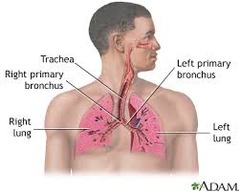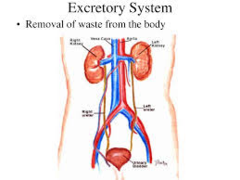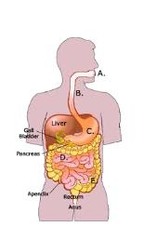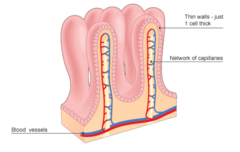Mcas Biology: Anatomy And Physiology Flashcard
Unlock all answers in this set
Unlock answersquestion
digestive system

answer
system responsible for breaking food into small molecules that can be taken in by cells
question
circulatory system
answer
system which is the transport (of gases, wastes, nutrients, etc) and delivery system of the body
question
respiratory system

answer
system responsible for taking in oxygen and releasing carbon dioxide using the lungs (alveoli!)
question
excretory system

answer
the organ system, including the kidneys and bladder, that removes waste materials from the blood
question
nervous system
answer
system that consists of brain, spinal cord, and nerves and regulates the body's responses to internal and external stimuli
question
mechanical digestion
answer
the physical breakdown of food into smaller pieces; occurs in mouth and stomach
question
chemical digestion

answer
the digestion process in which enzymes are used to break foods into their smaller chemical buiding blocks
question
esophagus
answer
a muscular tube that connects the mouth to the stomach
question
peristalsis
answer
wavelike contractions that move food throught the digestive system
question
stomach
answer
churns the food; HCl and pepsin work to chemically digest proteins
question
small intestine
answer
organ that completes the chemical digestion of food and absorbs the nutrients
question
villi

answer
finger-like projections lining the small intestine that absorb the nutrients and diffuse them into the blood
question
large intestine
answer
organ that absorbs water from undigested material
question
salivary glands
answer
produce saliva, which contains the enzyme amylase
question
Liver
answer
makes the bile; also removes toxins from the blood
question
gall bladder
answer
stores the bile
question
pancreas

answer
gland that makes digestive enzymes that break down carbohydrates, lipids, and proteins
question
bile
answer
chemical which breaks fats down into smaller globules
question
proteases
answer
enzymes produced by the pancreas to break down protein
question
lipases
answer
enzymes produced by the pancreas to break down lipids (fats)
question
sucrase
answer
enzyme produced by small intestine to break down the disaccharide sucrose
question
lactase
answer
enzyme produced by the small intestine to break down the disaccharide lactose
question
amylase
answer
enzyme produced by salivary glands and pancreas which breaks starch into sugar
question
heart
answer
pumps the blood
question
artery
answer
blood vessel with thick walls that carries blood AWAY from the heart; most carry oxygen rich blood
question
veins
answer
blood vessel containing valves that carries blood back to the heart; mostly carry oxygen poor blood
question
capillaries
answer
tiny, thin walled vessels that allow molecules to be exchanged
question
red blood cells
answer
type of blood cells responsible for carrying oxygen
question
platelets
answer
cell part that help clot blood
question
pharynx
answer
passageway for food and air; the throat
question
nasal passage
answer
warns, moistens, and filters incoming air
question
hemoglobin
answer
iron-rich protein in red blood cells that oxygen binds to
question
larynx
answer
passageway for air moving from pharynx to trachea; contains the vocal chords
question
epiglottis
answer
flap of cartilage that covers the trachea so food is pushed into the esophagus
question
trachea
answer
tube leading down to the lungs
question
cilia
answer
hair-like structures in the trachea that sweep out particles
question
mucus
answer
sticky substance that helps trap germs
question
bronchi
answer
large branches off the trachea that lead to the lungs
question
bronchioles
answer
smaller branches off the bronchi
question
alveoli
answer
air sacs at the ends of the bronchioles where carbon dioxide and oxygen are exchanged
question
diaphragm
answer
large muscle involved in allowing the lungs to expand and contract
question
carbon dioxide
answer
gas produced by cellular respiration that is collected by the blood and released from the lungs
question
oxygen
answer
gas brought into lungs and delivered to body cells by red blood cells
question
excretion
answer
getting rid of waste, i.e. carbon dioxide, urea, toxins
question
kidney
answer
organ that filters urea out of the blood
question
urea
answer
nitrogen rich waste product produced by cells breaking down proteins
question
urine
answer
liquid waste composed of water, urea, and salts
question
ureter
answer
tube carring urine from the kidney to the urinary bladder
question
urinary bladder
answer
temporarily stores the urine until it can be released from the body
question
urethra
answer
tube leading from urinary bladder to outside the body
question
nephron
answer
tiny filtering unit of the kidney
question
filtration in nephron
answer
removal of water, salt, urea, and glucose from the blood
question
homeostasis
answer
steady, internal state
question
neuron

answer
a nerve cell that transmits nerve impulses to communicate & control your body
question
sensory neurons
answer
neurons that carry incoming information from the sensory receptors to the brain and spinal cord
question
motor neurons
answer
neurons that carry information from the brain and spinal cord to muscles and glands
question
feedback loop
answer
basic type of control system in the body



